Learning Language Online: Reflections And Reviews
I’m an English teacher, but the first language I was taught was French. Like many, I started at middle school and continued to GCSE level. I found the language hard and didn’t think it would be useful until we did a weekend trip and I suddenly needed to know how to ask for food, prices and even where toilets were. After a total of 8 years of French classes, I finally got a D at GCSE level. This marked the end of my French experience and I waved goodbye to the Tricolore coursebook.
The teaching was at fault
For me, it was the grammar and the constant conjugation tables that failed to motivate me and which I couldn’t learn and so use. If you were good at memorising table after table, it seemed you were fine. I wasn’t as I like to learn and use language or rather, learn through using it. The same thing happened in Spanish as the teacher gave us tables to copy from the board in every lesson. I believed I was a bad language learner until I tried Mandarin and picked it up easily because the tenses were so simple and it was logical. It was also all about the vocabulary. I realised that this supposed ‘teaching’ I had been given had actually been teachers expecting rapid understanding and memorisation of rules and tables with very little spoken or written work.
Rekindling my relationship with French
Several years after university, I decided to rekindle my relationship with French before taking a job in France. I got one of those Instant French books with a CD for free with a copy of the newspaper and started studying units on my long daily commute surrounded by laughing commuters who found my lip pursing and mutterings about bread, cheese, and wine amusing. I found the book and approach interesting and I progressed and passed every unit. It was also audio lingual which I had never had at school.
Going to the next level
I then took our relationship to the next level by searching for online sites and apps and have now spent 5 years using and studying various online French learning programmes. Below you can read my reviews of all the French elearning apps I have used with my opinions and various ratings to reflect what I see as important to me as a learner. I hope this is interesting reading for other French learners and people interested in elearning in general.
Duolingo
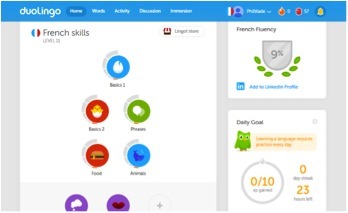
It seems you either love or hate Duolingo but you can’t argue that it’s popular, free and works on all devices. You have to bear in mind that the computer version is much better than the phone one so make sure you try it out on your PC or Mac. Duolingo is your typical gamified app with badges and celebratory noises. It works on listening, pron, grammar, vocab and writing/translation.
Yes some sentences are a bit strange and yes it does not really go from A1 to C1, more like A1, A2, A1, B1, A2, A1 and Z4. For me, I’ve done about 2/3 of the French course. I set goals and when I have time keep attaining them. It does work in the sense that I get more and more correct answers but my memory fades after a few days of non-use and it is really just random sentences not grammar. The revision tool is good for this and the flashcards are useful too but you have to keep using it every day.
Verdict
It’s not a typical course as it doesn’t follow a levelled progression and won’t really get your 4 skills up to C1 or help you write letters or hold a conversation or even read a newspaper BUT it’s fun as gamified elearning goes, makes you speak and I’m quite happy to do 4-6 lessons at one go.
- Progress: A2 to A2
- Pedagogy: 5/10
- User experience: 8/10
- Learning: 5/10
- Motivation: 9/10
- Emails: A daily prompt from the app and weekly summaries from the teacher version
- Would I renew?: It’s free.
Babbel
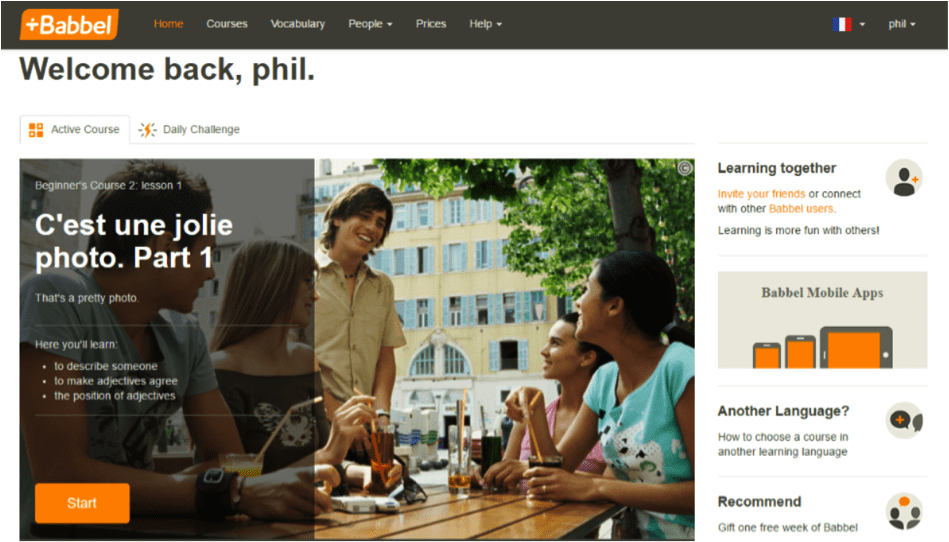
I started using Babbel with their free vocab app which may or may have not ‘inspired’ Memrise and Duolingo. Due to this not too painful experience, I signed up for a course via a very reasonable promotion and got started on my laptop. What worried me straight away was the syllabus. It had beginners courses and intermediate courses. But just those. It then offers extra courses like grammar, listening and speaking, reading and writing, and words and sentences. The main courses are broken down into topics then mini lessons.
Babbel, like Duolingo, uses voice recognition and the same kind of translation vocab exercises as Duolingo but makes you listen to, read and then repeat the words then write new words but that is done by just clicking on letters of mixed up words. Grammar chunks very small but very digestible.
It also reviews the vocab in a test.
Verdict
It’s OK for really learning vocab as it drills it in via listening, reading, writing and speaking, but it doesn’t go above intermediate. Also, the extra lessons seem a bit random and are not integrated. It would be better with more core lessons up to C2. After almost a year, I gave up as I had completed the main parts. For the money though, at 5 quid a year, it’s probably worth it.
- Progress: A2 to A2+/B1
- Pedagogy: 7/10
- User experience: 7/10
- Learning: 6/10
- Motivation: 6/10
- Emails: Basic salesy adverts to buy other courses
- Would I renew?: No
Frantastique
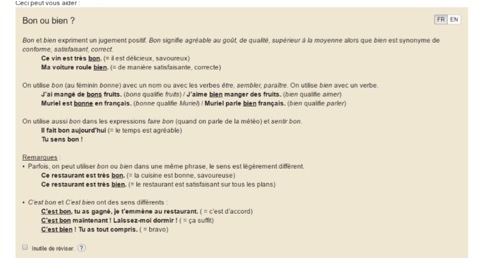
Frantastique is from the same people as Gymglish which is alleged to be ‘the top e-learning app in France…’. Each lesson is a 10-15 minute daily hit of French, including reading or listening, vocab, and some conjugations.
I like that it is daily and it aims to go from A1 to C1 but it employs the supposed ‘golden rule of e-learning’ in that they use ‘fun’ content. They call it ‘sauce’. This means videos of aliens, painters having affairs, a boss eating his assistant, etc. All the content is based on that so it can be odd. It also uses ‘adaptive learning’ that consists of sentences and words. You click on the French word to reveal a translation, and you then choose how well you know it. Later, the word will appear again. You do this with 10-20 items per day so it is just repeated visual exposure. It then repeats sections from previous lessons you got wrong.
A bit lacking
For me, I did a year and allegedly went from A2 to B1 and then they ran out of lessons. I asked to move up but they said I had to restart with the test. Again, I went from A2 to B1. Their method is test, results and optional email with more definitions. By ‘test’, they also mean test you on things you have not seen before. Apart from big grammar explanations, the ‘teach’ bit is lacking. For me, I like to learn and then be tested, so my motivation goes down when I cannot get above 70% because I don’t get the chance.
Also, my big problem with the curriculum is grammar. Frantastique just gives you conjugation tables with gaps to fill and sometimes they even show you completed table and then you click, they remove some gaps and you have to fill it from memory. There is a similar issue with some listening comprehension as the transcript is just above the exercise so you just copy and paste.
Verdict
After 2 years of daily lessons (Monday to Friday), I’ve learned some words but still have not mastered any tenses or conjugations. It really seems to be more of a random lesson course and about introducing grammar than learning and mastering it. There is nothing functional about it. It relies on the ‘fun, bit of this and that’ approach. It doesn’t work for me as it is too similar to the French method that failed me at school. I think after 2 years and 500 lessons, it should have helped me get higher than A2 to B1 twice.
- Progress: According to Fantastique: Year 1 (250 lessons) : A2 to B1. Year 2 (250 lessons) A2 to B1.
- According to me: Reading: A2-B1. Listening: A2 Speaking: A2 Writing A1
- Pedagogy: 4/10
- User experience: 4/10
- Learning: 3/10
- Motivation: 2/10
- Email: No but lessons come in 2/3 emails
- Would I renew?: No. I recommend people only sign up for 6 months
Rocket French
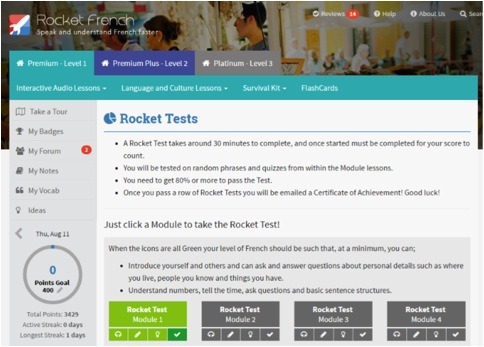
I’ve always wanted to speak fluently and to be able to function in situations in French. RF meets those needs. After 4 years of trying everything I could and failing to learn and master how to even function in a shop, RF immediately hit the right spot. It’s not revolutionary in its pedagogy but it delivers. It has levels and progresses you through topical situation lessons and makes you really speak words and sentences as well as write. Lessons also have useful tests and there is a gamified points system to keep you motivated. Not being a fan of full-screen lengthy grammar explanations, I find RF’s method of incorporating grammary lessons into your course without heavy grammar burnout or high school teacher presentation boredom. It makes them more ‘in context’ and with a functional angle rather than just ‘you must learn this’.
What’s also very good
What’s also very good is that RF embraces the podcast generation with quite long intro mp3s that it uses to introduce the lesson and all the language. For me, the best part though is that they have learned from Babbel’s dialogues and taken them several steps further. They have a dialogue based on the lesson’s content that you listen to and then say the missing parts. Simple, yes. BUT, you can choose to be either speaker A or B and also the difficulty level. I personally start at level 1 where you read the answers in the gapped dialogue and the voice recognition checks your pronunciation. Then I work upwards until I get to the top level where you have no help and must listen to questions and reply but with no clues. This is the closest I have experienced to simulating a real conversation.
It’s a welcome surprise
If you have tried other e-learning that isn’t made with learners in mind, RF is a welcome surprise as it is written by people for people. The 2 presenters in the first podcast and the 2 doing the roleplay make it friendly and welcoming. Whereas some e-learning perceives students as empty boxes able to digest lengthy grammar explanations or just repeat like parrots, RF knows what you need to know, how you can understand it, and it delivers. There’s no frustration after lessons or doubts about what you learned.
Verdict
This is the best e-learning app I’ve tried. I feel I am learning and able to handle more speaking situations. It offers a syllabus you can go through or choose from and it has good tests. All in all, it is a real teaching, learning and testing course and definitely for the more serious language learner.
- Progress: A2 to B1 (2 months)
- Pedagogy: 9/10
- User experience: 8/10
- Learning: 8/10
- Motivation: 8/10
- Email: Daily with useful phrases and your progress
- Would I renew?: Yes
Kwiziq
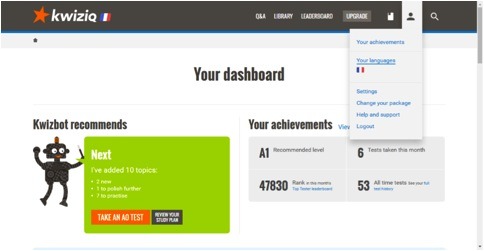
Kwiziq markets itself as an A.I. coach and it’s all about tests or rather, quizzes. It works like this: you do a quiz, you get feedback, and then you do another similar quiz. Every completed quiz gives the AI coach more information about you so it can build your personalised learning path. I would say that the coach knows more about my grammar abilities than my French teacher. There’s no hiding your grammar gaps. It’s not called the ‘crack cocaine of language learning’ for nothing. Kwiziq REALLY finds out what you can do and what you cannot.
Better for those who make few errors
As you may have noticed, my level is quite low but Kwiziq says and proves that my grammar level is very very low and I really believe it. In my opinion, this app might be better for students of B2+ who have small errors and need to perfect them. For someone like myself, I need to learn first so I’d be better off combining Kwiziq with a typical course and using it to check my grammar at every CEFR level. Yes, Kwiziq shows exactly where you are in CEFR land and by grammar area.
I’m convinced that Kwiziq will get better and better, as shown by their recent update. It is the kind of student-focussed, big data, tailored grammar work good students need but it needs to make sure 1) it does teach in an effective way and 2) the user increases their retest scores as mine sometimes go down.
Verdict:
Kwiziq is the best grammar testing software I’ve seen in any language. It really shocks you how accurate it is and the AI aspect immediately goes to work plotting your path but I personally need to learn more before using it to get the ‘perfection’ aspect.
- Pedagogy: 7/10
- User experience: 7/0
- Learning: 5/10
- Motivation: 7/10 until test 3/4 with the same score or lower.
- Email: Daily with at the start with very good ‘based on your level, we suggest you learn this phrase..’ but the emails become less frequent if you don’t use your account.
- Would I renew?: I have the free version and would consider buying a premium account
Conclusions
I’m definitely not a good language learner and my learning style does not benefit from most apps. I like listening and speaking with writing. I also need grammar to be very simply explained and then I need to be helped to master it. As a customer, I want to see progress and to get a return for my money.
I’ve looked at and tried almost every course I have found within my price range. Other alternatives have online lessons, but the core issue is that I really don’t learn via the old high school method of big grammar presentations and conjugation tables and testing. App companies can make the fanciest, coolest apps ever but if they just keep churning out the same pedagogy with an ‘if it ain’t broken, don’t fix it’ ideal, nothing will change.
If I were to suggest elearning courses for a new English speaker learning French, I’d so go for Rocket French for daily or weekly study but also Kwiziq for occasional grammar testing and perfecting.
There is a new indie entrant, J’accorde, soon to be in the Beta stage, which is worth keeping an eye on as it is visually attractive and actually does the ‘cool cartoon images’ strategy very well. It’s also gamified and is made by a small team who really want to make a difference.
Useful websites
Some free French lessons and reviews: The French Experiment
Advanced French aimed at women and real speaking: Comme une Francaise
Acknowledgements
I bought a 1-year Babbel course
I have the free 10-test Kwiziq account and did a 1-week all access trial.
I bought 3 years of Frantastique
I have a 1-year all level Rocket French account

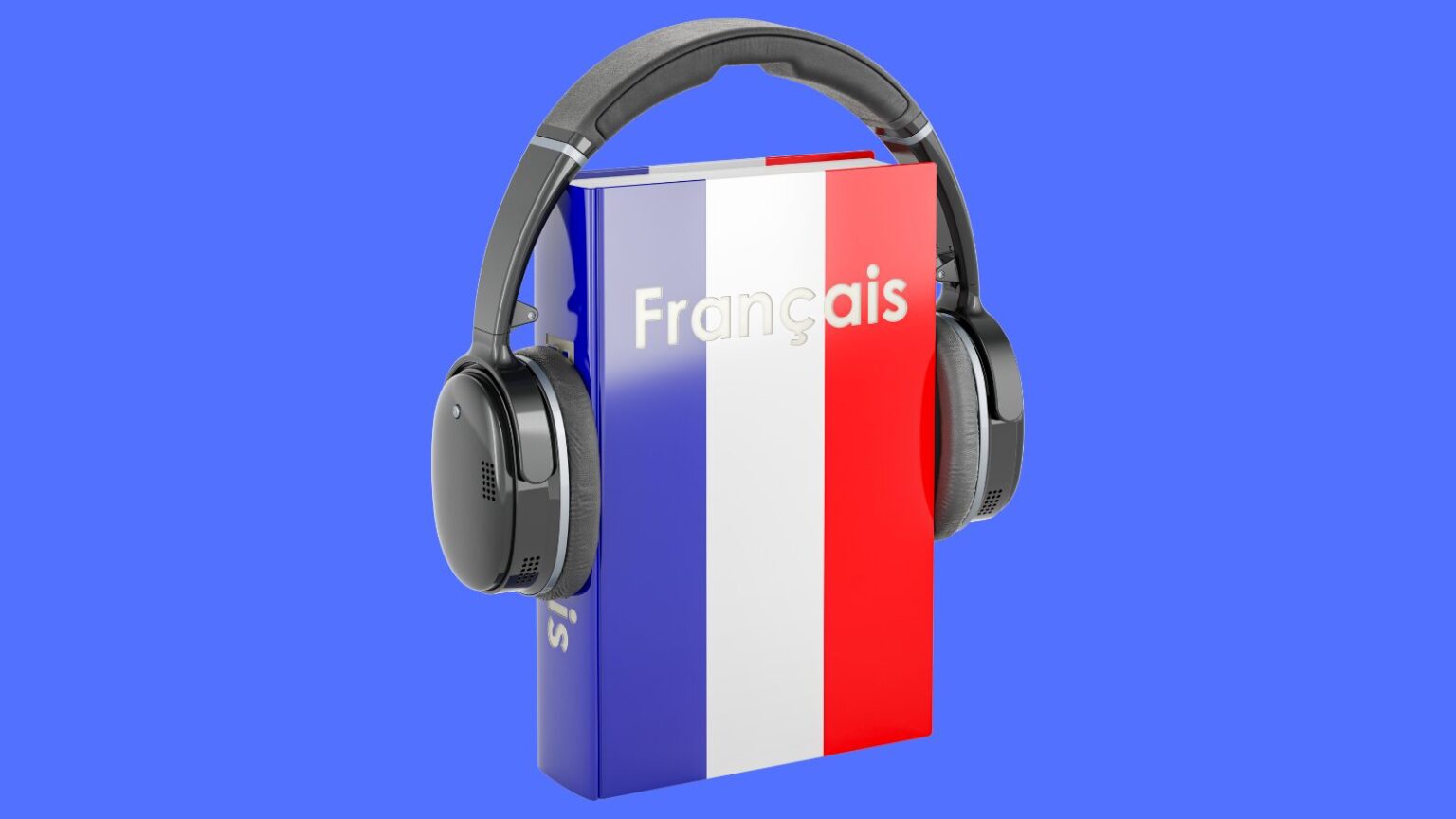





3 Responses
Bill
The problem with evaluations is that no two people learn the same way. The Memrise A1 and A2 German courses have helped me a great deal but perhaps they leave you cold. Try a few online courses and when you find one that is helping you stick with it. Memrise helps me with vocabulary, pronounciation, reading, and stringing words together in the proper order. I compliment it with a spaced repetition vocabulary memorization program and Pimsleur courses for speaking practice. I use these programs on a daily basis and find that I progress faster than with a weekly session with a tutor and the tutor specifying the homework. I think you have to be somewhat fluent before immerseing in a country of native speakers or you will be hopelessly lost.
06/07/2017
theorangedip
Wow superb blog layout How long have you been blogging for you make blogging look easy The overall look of your site is magnificent as well as the content
08/09/2024
Audley Green
Thanks for your comment. We value each comment and use it to improve the usability of our page for you the viewer. In response to your question, this is the result of years of practice. Again, we are grateful you have stopped by.
08/09/2024